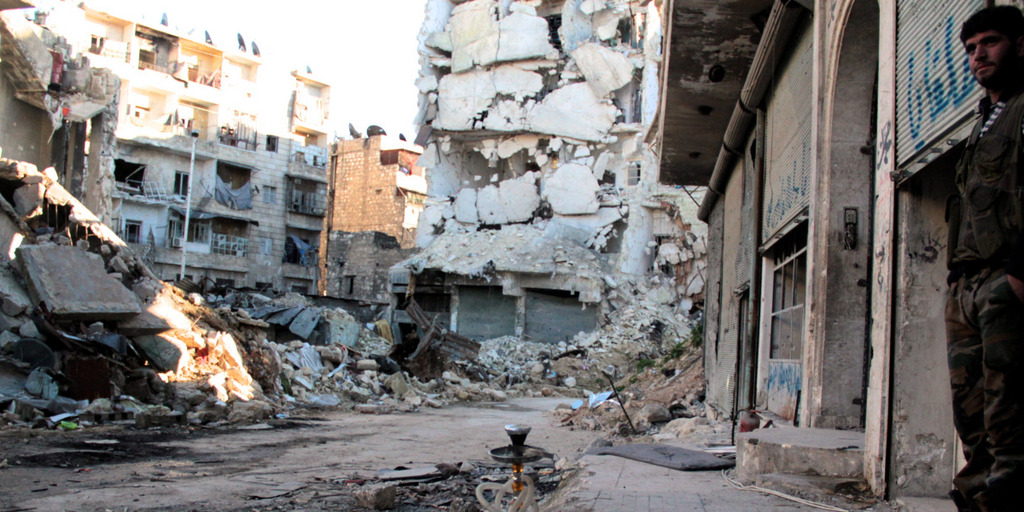Strengthening policy consensus among EU member states and with the US
To stop the suffering and the war, however, Brussels should take a stronger political stance, because the risks surrounding the Syrian conflict remain high. Here are just six: (1) Health, social and economic structures are continuing to collapse as a result of war, displacement, corruption, sanctions and the consequences of the corona pandemic in the three Syrian territories (Assad-held region, Idlib province, North-East). (2) The war surrounding Idlib province can be expected to continue if the Turkish-Russian ceasefire does not hold. (3) Military confrontations between Israel and Iran continue. (4) The Kurdish-Turkish conflict continues to smoulder. (5) Some “Islamic State” cells are re-strengthening. (6) Lebanon is drifting into social and financial chaos, and almost 1 million Syrian refugees are affected by the poverty and misery there.
The main external military actors are Russia, Iran (with militias including Hezbollah), Turkey and the US (with two remaining military bases).
“The Syrian regime led by President Bashar al-Assad has not yet achieved a complete military victory, but with Russian and Iranian help, it has ensured that it cannot be forced to step down. So far the regime may have won the war, but probably not the peace.”, said Middle East expert Daniel Gerlach in an article of Die Welt recently.
Efforts by the United Nations to find a political solution to the conflict in accordance with UN Resolution 2254 have been at a standstill for years.
The EU has been supporting this UN-approved solution diplomatically (see EU Syria Strategy of 2017 and the declarations of the four Brussels Syria Conferences). In the long term, however, Brussels would like to see the unity, sovereignty and territorial integrity of the Syrian state established and the state functioning as a respected neighbour within the framework of the direct neighbourhood. This would mean a “new Syria” that would develop in the direction of states like Tunisia and Georgia, with stability and resilience based on pluralistic structures, the rule of law, good governance and inclusive social and economic participation. These are all criteria from which the Assad regime and the Islamist militias in Idlib are far removed.
The EU’s current hesitant and cautious Syria policy can be explained by the following: (1) Europe seems to have little influence when it comes to changing the behaviour of the Assad regime. (2) Europe seems to have limited tools to apply pressure (member states are reluctant to use military force) and few available incentives to decisively change the behaviour of Russia, Iran and Turkey. (3) European governments are concerned about having to reintegrate IS fighters who hold European citizenship. (4) European governments want to prevent more Syrian refugees from leaving Turkey for Greece, Cyprus and Bulgaria. (5) There is growing controversy among EU member states over the degree to which Europe should cooperate with the Assad regime in reconstruction efforts, as well as different assessments of the effectiveness of sanctions and how to deal with Turkey and Russia.
Even if the EU’s policy towards Syria is cautious for these five reasons, the EU-27 should nevertheless become more active in the following diplomatic fields in order to prevent the Syrian conflict from further spilling over into the EU:
(1) Re-strengthening the consensus of the EU-27 through more intensive dialogue with critics of the EU-Syria strategy, which can also be done by integrating Poland and Italy into the EU/E3 policy format; (2) more comprehensive coordination with US policy on Syria – starting with negotiating exemptions from US sanctions for humanitarian reasons; (3) maintaining targeted EU sanctions and not letting the regime decide on the distribution of humanitarian aid, bypassing it instead by shifting involvement to other internal societal forces; (4) intensive shuttle diplomacy, with several EU foreign ministers simultaneously travelling between Washington, Moscow, Ankara, Tehran, Riyadh and Jerusalem to reduce regional confrontations related to Syria; (5) close monitoring of the activities of Syrian embassies in EU member states, prevention of illegal activities and issuance of passport substitutes to EU-based Syrians in order to deprive the regime of access and income; (6) engagement in a dialogue involving Syrian Kurdish decision-makers and Turkey, with the aim of having Syrian Kurds become full-fledged citizens of a “new Syria”.




![[Translate to English:] Ein Mann läuft durch eine komplett zerstörte Straße](/fileadmin/files/_processed_/d/e/csm_91467146816969008478_36ccc11324_o_8477bfdb23.jpg)


